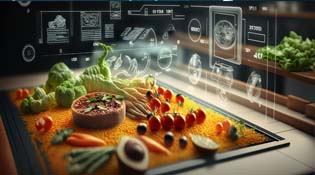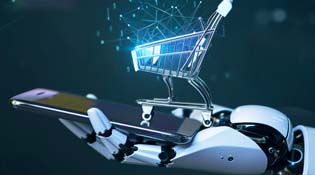You need to login in order to Like
AI In Food Industry: Quality Control & Food safety
By Vishakha Thakur
Artificial intelligence, popularly known as AI is constantly driving enormous changes in a variety of commercial areas, including the food industry. There are various ways with which Artificial Intelligence can improve the food industry such as increasing efficiency, creativity, and environmental sustainability. AI is serving to be a game changer since it enhances customer service and makes food safer.
Let’s study the uses of AI in the food business, its benefits as well as how it is transforming the food industry.
AI in Food Industry
Artificial intelligence is mainly a field that enables machines to do certain tasks which usually need human intelligence. Tasks such as recognizing sights and sounds, making judgements along with interpreting languages. AI is widely used and regarded for reducing waste, which has been a severe problem in the food industry. AI can also be used to maintain the quality of food as well as enhance efficiency in food production. Interestingly, the application of AI is used at various segments of the food industry such as farming, food processing, quality control, and customer service.
Applications of AI in the food industry
Applications of AI in the food industry are diverse as well as impactful.
Agriculture & Farming
AI is being used in improvising the farming industry. Use cases of Artificial Intelligence consist of monitoring crop health, soil condition and weather using data analytics, sensors, and drones. It is powered by artificial intelligence and assists farmers in making informed decisions, maximizing resources and producing more crops.
Food Processing & Production
AI-controlled robots and machines can easily do work such as Sorting, grading, and packaging. These instruments can function swiftly and precisely, guaranteeing that the manufacturing line is uniform and high-quality. AI also assists with predictive equipment repair, which reduces downtime and prevents malfunctions before they occur.
Quality Control
AI tools track food quality. Machine learning algorithms may detect flaws and irregularities in food, ensuring that only high-quality products reach consumers. The process is made a lot simpler by employing inspection systems that are powered by AI. These tools help in image recognition to detect pollutants as well as ensure food safety.
Managing Supply Chain
Artificial Intelligence is widely regarded for the enhancement it provides to the supply chain industry. One can benefit with real-time data on logistics, guaranteed on-time product delivery, enhanced supply chain operations, and lesser food waste. AI systems are able to forecast demand over time, which aids with inventory control and reduces overproduction.
Personalised Nutrition
If you are a health-conscious person, AI can help in providing nutritional guidance customised specially for you, ultimately contributing to the food industry. AI analyses your dietary needs, habits and preferences along with other necessary health information. In fact, AI can also offer personalized meal programs and dietary supplements to assist people accomplish their health goals.
Customer Service & Marketing
AI improves customer service and marketing in the food business by assessing consumer data and providing tailored experiences. AI-chatbots are known for giving immediate assistance along with marketing strategies based on specific demographics with personalized offers as well as promotions.
Sustainability
Sustainability is the need of the hour and Artificial Intelligence can help in solving this issue at least in the food industry. With the help of AI, food wastage can be eliminated, and resource utilization can be optimised based on data. In fact, AI-powered tools and bots can help in promoting environmentally friendly practices and contribute to sustainable food production and delivery.
Food Traceability
With tracking the entire supply chain, AI improves food traceability. Imagine, if AI is integrated with Blockchain technology, what wonders it can do. The combination of both the technologies ensures transparency and traceability, thereby allowing customers to track the origin and route of their food.
Benefits of using AI in the Food Industry
The benefits of using artificial intelligence in food industry are many and some of them are listed below:
Enhanced Efficiency
Artificial intelligence has the power to eliminate lethargic behaviour as it can automate the time-consuming tedious tasks. This helps in freeing up human workers to perform more complex and valuable activities, increasing production.
Increased food safety
AI systems have the ability to enhance the safety of food by keeping a check on monitoring quality as well as figuring out adulteration rapidly. This helps in reducing the food-borne diseases which ensure customer safety and protect the brand’s reputation.
Customized service for every customer
AI makes customers happier by providing more customized experiences. By assessing consumer data, AI may provide tailored recommendations and improve service, increasing client loyalty and assisting businesses in retaining them.
You need to login in order to Like





















